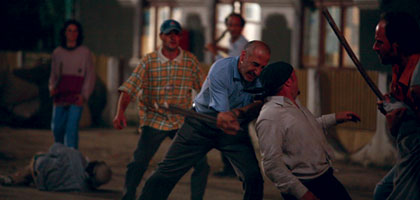California Dreamin' (Endless)
Romania 2007

Reviewed by Kieron Corless
Synopsis
Our synopses give away the plot in full, including surprise twists.
Romania, May 1999. During the Nato bombing of Yugoslavia, Nato radar equipment crosses Romania by train heading to the Serbian border, guarded by a US company under the command of Captain Jones. At Capalnita village, the Americans' train is halted by corrupt, powerful stationmaster Doiaru, because they don't have customs papers. In fact Doiaru has long borne a grudge against America - in 1944, the Americans failed to intervene in Romania and his parents were seized by the invading Russians for having collaborated with the Germans. Captain Jones phones several people in authority to help resolve the situation. The American soldiers' presence during their five-day enforced stay excites the local girls, including Doiaru's 17-year-old daughter Monica, who makes a play for Sergeant David McLaren. Jones heads to Doiaru's for a quiet chat, but Doiaru remains deaf to his overtures. Monica enlists classmate Andrei, who speaks English, to translate for her and David, unaware he's in love with her. The three head off that night to a party in Bucharest, where David and Monica have sex. The next day in Capalnita, the Romanian secretary of state arrives, but Doiaru insists he too must get the right papers. The mayor complains to Jones that Doiaru is too powerful, partly because of his close relations with the head of police, and has undermined the village's wellbeing. Jones offers to assist in usurping him and addresses a meeting of villagers to rally support. Meanwhile the customs papers have finally arrive and Doiaru is sacked. As the Americans leave, a fight breaks out between Doiaru's people and his opponents; Doiaru is killed in front of Monica. We learn that the radar arrived at its destination two days after the peace treaty was signed. A coda in a Bucharest café five years later shows Monica and Andrei meeting up as student friends.
Review
The latest release in what's now dubbed the Romanian new wave trails a dire backstory: director Cristian Nemescu perished in a car crash, along with his sound editor Andrei Toncu, when California Dreamin' (Endless) was deep in post-production in August 2006. The film's producer Andreí Boncea decided to release the film as it stood ('endless' in the title should really read 'unfinished'), and Nemescu was posthumously awarded the Un Certain Regard prize at Cannes in 2007. Deservedly so; at 27 Nemescu was the youngest of his lauded Romanian contemporaries, with whom his striking shorts and debut feature share a good few stylistic traits and thematic preoccupations - dark-tinged, deadpan humour, a satirical eye for the ironies and absurdities of post-Ceausescu Romania, and a laidback, naturalistic observation of everyday life, into which he occasionally liked to weave fantastical elements, as in the memorable short Marilena from P7.
California Dreamin' is a heavily fictionalised version of a real event, and an impressively ambitious undertaking for a debut feature. In May 1999, during the Nato bombing of Yugoslavia, a train carrying Nato radar equipment sets off across Romania en route for the Serbian border, guarded by a US company under the command of implacable Captain Jones (Armand Asante). The train is held up at a small village for five days by corrupt, intractable stationmaster Doiaru (Razvan Vasilescu, magnificently imperious and slippery) ostensibly for want of customs papers, but in truth because Doiaru bears a longstanding grudge towards America, the cause of which is drip-fed to us in black-and-white flashbacks to 1944. From the ensuing head-to-head between Doiaru and Jones, Nemescu branches out to register the consternation aroused in the villagers by the Americans' arrival, not least the opportunist mayor (Ion Sapdaru, who seems to be in every recent Romanian film) and the young women, including Doiaru's bored, disaffected teenage daughter Monica (Maria Dinulescu).
It's a set-up ripe for comedy of cultural misunderstanding and miscommunication, which Nemescu exploits to the full. As Jones, Asante looks as if he's come fresh from busting heads in The Sopranos - a jut-jawed, bullnecked study in goonish self-righteousness, ill equipped to deal with Doiaru's sly machinations. Nemescu has plenty of emasculating fun with Jones and by implication misguided US interventions, although arguably he starts to lose his grasp on the character towards the end - apart from a beautifully weighted, pregnant exchange of glances with the much cannier, light-on-his-feet subordinate Sergeant McLaren (Jamie Elman) as the Americans finally depart the village.
If America gets a bit of pasting here - Jones instigates the bloodbath at the end, but reneges on his promise to help out - Nemescu doesn't spare his fellow Romanians either. A fax-machine in a government office coughing missives into a neglected pile is a nicely compressed but telling statement on Romanian governance and bureaucracy. Doiaru's self-interest and corruption - he sells on goods nicked from passing trains - are strangling the village, and are underwritten by the local police chief. It's a film replete with biting political ironies, but always filtered through character and situation, and throughout there's a lightly worn sense of larger historical forces animating the action, of the past in the present.
Inevitably, hope resides in the younger generation, and especially Monica - impatient, sexy, sassy, full of life, perfectly incarnated by Dinulescu. Unlike many male directors, Nemescu can actually do sexual attraction and eroticism convincingly, given a lovely comic edge here by the sparks and shocks Monica literally produces when she touches a man (a carryover, like the Elvis impersonator, from Marilena from P7). Her truncated fling with McLaren shades into a burgeoning friendship with the lovelorn local 'dweeb' Andrei (Alex Margineanu) and culminates in the ungainly, enigmatic but incredibly moving final scene - though admittedly it's hard to pinpoint exactly why it is so heartrending. Inevitably, given the circumstances of its release, there are flaws, longueurs, redundant scenes, implausibilities, particularly in the final third - but who cares? What we have is alive to nuance and detail, thrilling in its looselimbed buoyancy, thanks in part to restless, darting handheld camerawork, and evinces a total engagement with every corner of the film's broad canvas. Above all it's often just very funny, then sad, and finally tragic - Nemescu it seems could handle it all, and had he lived, there's no doubt he had an outstanding career in front of him. What a terrible loss.
Credits
- Director
- Cristian Nemescu
- Producer
- Andreí Boncea
- Screenplay
- Cristian Nemescu
- Tudor Voican
- Co-writer
- Catherine Linstrum
- Director of Photography
- Liviu Marghidan
- Editor
- Catalin Cristutiu
- Production Designer
- Ioana Corciova


